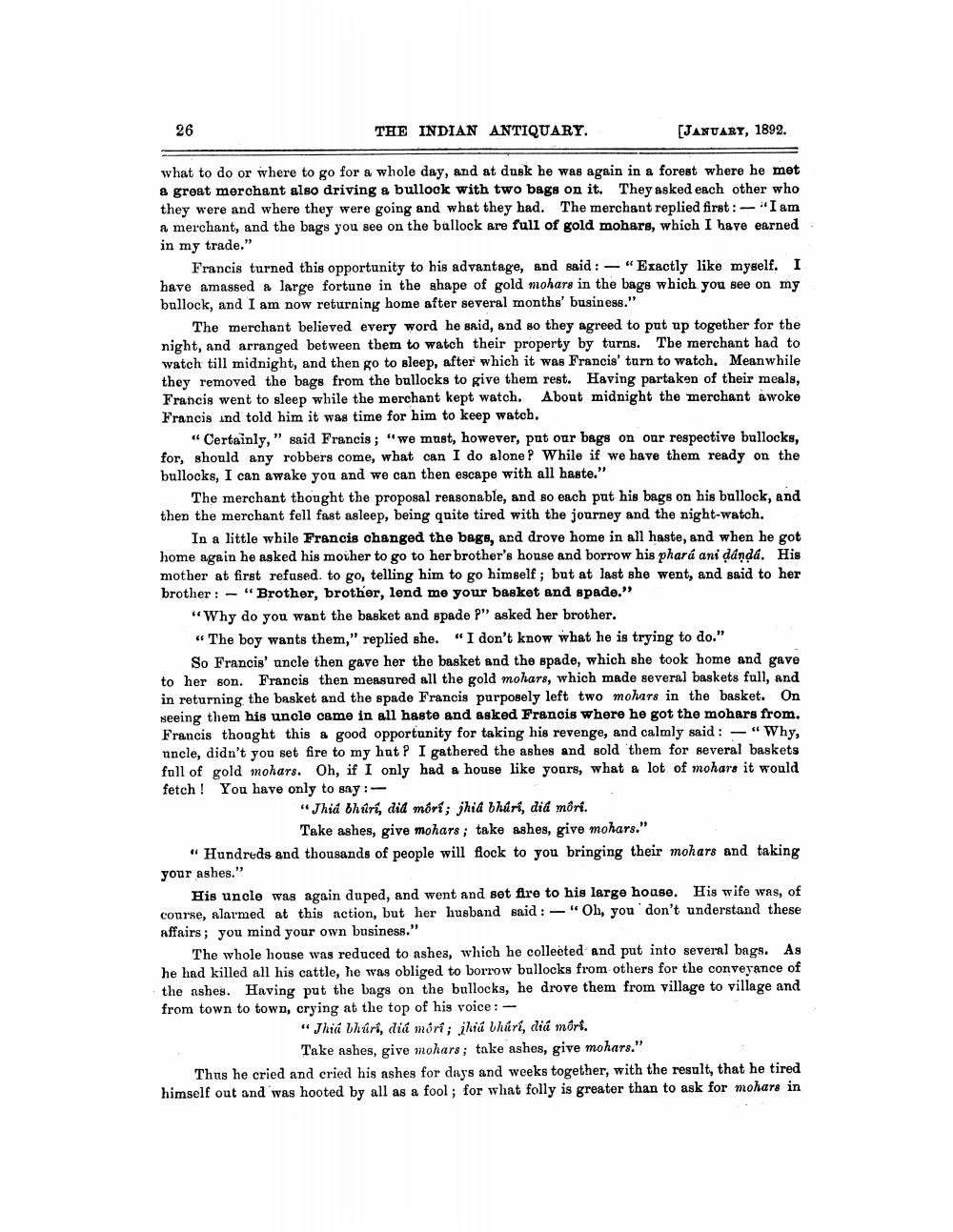________________
26
THE INDIAN ANTIQUARY.
[JANUARY, 1892.
what to do or where to go for a whole day, and at dusk he was again in a forest where he met a great merchant also driving a bullock with two bags on it. They asked each other who they were and where they were going and what they had. The merchant replied first: "I am a merchant, and the bags you see on the ballock are full of gold mohars, which I have earned in my trade."
Francis turned this opportunity to his advantage, and said: - "Exactly like myself. I have amassed a large fortune in the shape of gold mohars in the bags which you see on my bullock, and I am now returning home after several months' business."
The merchant believed every word he said, and so they agreed to put up together for the night, and arranged between them to watch their property by turns. The merchant had to watch till midnight, and then go to sleep, after which it was Francis' tarn to watch. Meanwhile they removed the bags from the bullocks to give them rest. Having partaken of their meals, Francis went to sleep while the merchant kept watch. About midnight the merchant awoke Francis ind told him it was time for him to keep watch,
"Certainly," said Francis ; "we must, however, put our bags on our respective bullocks, for, shonld any robbers come, what can I do alone P While if we have them ready on the bullocks, I can awake you and we can then escape with all haste."
The merchant thought the proposal reasonable, and so each put his bags on his bullock, and then the merchant fell fast asleep, being quite tired with the journey and the night-watch.
In a little while Francis changed the bags, and drove home in all haste, and when he got home again he asked his mother to go to her brother's house and borrow his phará ani dánda. His mother at first refused to go, telling him to go himself; but at last she went, and said to her brother: - "Brother, brother, lend me your basket and spade."
“Why do you want the basket and spade P" asked her brother. “The boy wants them," replied she. “I don't know what he is trying to do."
So Francis' uncle then gave her the basket and the spade, which she took home and gave to her son. Francis then measured all the gold mohars, which made several baskets full, and in returning the basket and the spade Francis purposely left two mohars in the basket. On seeing them his uncle came in all heste and asked Francis where he got the mohars from. Francis thought this a good opportunity for taking his revenge, and calmly said: - "Why, uncle, didn't you set fire to my hut? I gathered the ashes and sold them for several baskets full of gold mohars. Oh, if I only had a house like yours, what a lot of mohars it would fetch! You have only to say:
“Jhiá bhúri, did mörí; jhia bhúri, diá môré.
Take ashes, give mohars; take ashes, give mohars." "Hundreds and thousands of people will flock to you bringing their mohars and taking your ashes."
His unclo was again duped, and went and set fire to his large house. His wife was, of conrse, alarmed at this action, but her husband said: - "Oh, you don't understand these Affairs; you mind your own business."
The whole house was reduced to ashes, which he collected and put into several bags. As he had killed all his cattle, he was obliged to borrow bullocks from others for the conveyance of the ashes. Having put the bags on the bullocks, he drove them from village to village and from town to town, crying at the top of his voice: -
“ Juiá bars, dia mori; luiá hú rí, dia môrs.
Take ashes, give mohars; take ashes, give mohars." Thus he cried and cried his ashes for days and weeks together, with the result, that he tired himself out and was hooted by all as a fool; for what folly is greater than to ask for mohars in




